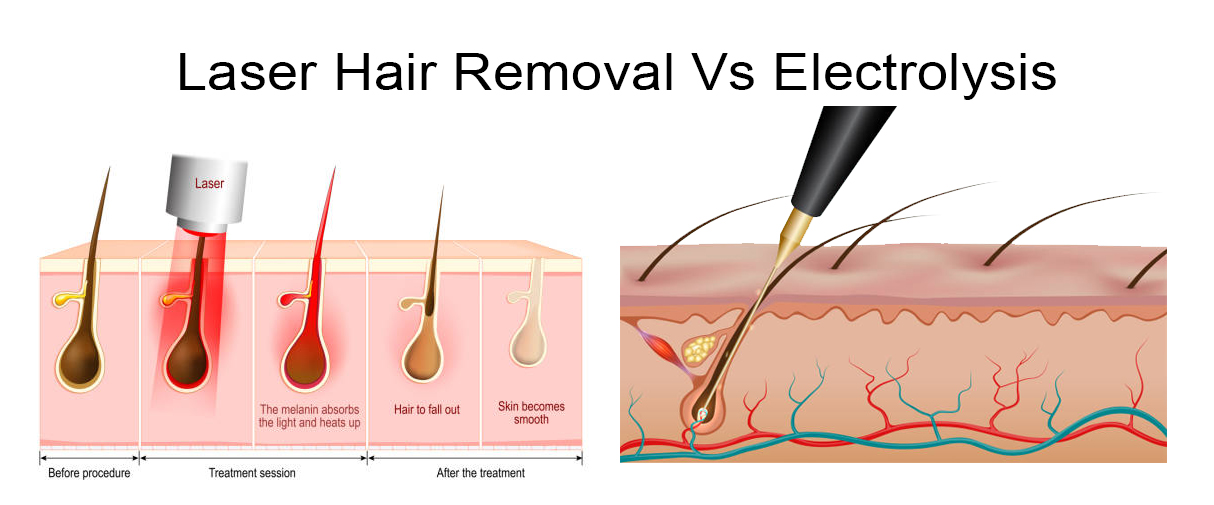Table of Contents
Introduction
In our relentless quest for smooth, hair-free skin, two treatments have stood out in cosmetic procedures: laser hair removal vs electrolysis. Both techniques provide a more enduring solution than conventional hair removal methods like shaving or waxing. While they serve the same end goal – reducing or removing unwanted hair – their processes, technologies, and outcomes differ. Given the growing popularity of these treatments, it’s essential to understand their fundamentals, benefits, and potential downsides, allowing individuals to make informed decisions.
Understanding the Basics
What is Laser Hair Removal?
Through intense light beams, laser hair removal is a medical method to impact and harm distinct hair growth points. The process works by directing the laser onto the skin. The pigment in the hair absorbs the light, causing thermal damage to the follicle, inhibiting or delaying future hair growth.
Different types of lasers are employed in this procedure, including Alexandrite, Diode, Nd: YAG, and Ruby. Each type caters to specific skin types, hair colours, and treatment areas, ensuring effectiveness and safety.
Laser hair removal is often sought for larger body areas, like the legs, back, and chest. However, it’s also used for more delicate regions such as the face, underarms, and bikini line. Its ability to treat multiple follicles at once offers a relatively quick solution, especially for larger surface areas.


What is Electrolysis?
Conversely, electrolysis is a technique for inserting a slender probe into the hair root, followed by an electric charge. This process destroys the hair growth center through chemical or heat energy, ensuring that treated hairs won’t grow back.
There are three main types of electrolysis:
- Galvanic: which uses a chemical reaction to destroy the hair follicle.
- Thermolysis: which applies heat to obliterate the follicle.
- Blend a combination of both galvanic and thermolysis for a more effective result.
Unlike laser hair removal, which can treat multiple follicles simultaneously, electrolysis addresses each hair individually. It’s ideal for smaller areas or precision work, such as eyebrows, upper lip, and chin. Moreover, it’s recognized as the only FDA-approved method for permanent hair removal, making it a go-to choice for many who seek lasting results.
Laser Hair Removal vs Electrolysis: Pros and Cons of Each Method
Both laser hair removal and electrolysis have advantages and disadvantages, catering to different needs, skin types, and end goals.
Laser Hair Removal:
Pros:
- Faster, especially for larger areas.
- Generally considered less painful by many.
- It is effective on most skin types when the right laser is used.
Cons:
- It might work less effectively on lighter-coloured hair or darker skin tones.
- Multiple sessions are required, with maintenance treatments over time.
- Potential for temporary side effects, such as redness or swelling.


Electrolysis:
Pros:
- Suitable for all skin and hair types.
- Recognized as a method for permanent hair removal.
- Offers precision for smaller areas.
Cons:
- Typically, it is more time-consuming due to its hair treatment approach.
- Some find it more painful than laser treatments.
- It also requires multiple sessions, often more than laser treatments, spread over a longer period.
Advantages of Laser Hair Removal
Laser hair removal has surged in popularity over recent years and for several compelling reasons:
- Speed and Efficiency: A standout benefit of laser hair removal is its quickness. The laser can target multiple hair follicles simultaneously. This means that larger areas, such as the back or legs, can be treated relatively quickly, often within an hour or less. Comparatively, treatments like waxing or shaving take considerable time, especially when considering their frequency.
- Suitable for Larger Areas: Owing to its effectiveness, laser hair removal is a prime choice for those looking to address large body sections. While traditional methods can be tedious for larger surfaces, lasers provide a quicker and more efficient approach, making it ideal for areas like the chest, legs, and back.
- Less Painful for Some Individuals: While pain tolerance varies from person to person, many individuals find laser hair removal less painful than alternatives like waxing or epilating. The sensation is often likened to a rubber band snapping against the skin—a sharp but quick discomfort.
Disadvantages of Laser Hair Removal
While laser hair removal offers multiple benefits, it’s crucial to consider its downsides:
- Effectiveness on Varied Skin and Hair Types: Laser hair removal works best when there’s a contrast between the hair colour and the skin tone, making it most effective for individuals with light skin and dark hair. Those with blonde, gray, or red hair might see insignificant results. Some lasers aren’t suitable for darker skin tones, risking burns or discoloration, though technological advancements are improving inclusivity.
- Potential Temporary Side Effects: Post-treatment, some individuals might experience redness, swelling, or minor discomfort in the treated area. While these side effects typically subside within a few hours to a few days, they can be inconvenient, especially if a significant event or outing is planned shortly after the treatment.
- Need for Multiple Sessions: For optimal results, multiple sessions are necessary. Hair growth occurs in different cycles, and the laser effectively targets hairs in the active growth phase. Several sessions spaced a few weeks apart are often required to ensure most hairs are targeted.
Advantages of Electrolysis
Electrolysis, being around longer than laser treatments, also boasts several advantages:
- Versatility: Unlike laser treatments, electrolysis is effective on all hair colours and skin tones. Electrolysis can cater to your hair removal needs without discrimination, whether you have light, gray, or red hair or a deeper skin tone.
- FDA-Approved Permanent Hair Removal: Electrolysis is the only FDA-approved method for permanent hair removal. While laser treatments can reduce hair growth, electrolysis can eliminate the hair’s ability to regrow from the treated follicles.
- Precision: Electrolysis offers unparalleled precision. Given that it treats individual hairs, it’s excellent for areas that require meticulous work, such as the eyebrows or upper lip.
Disadvantages of Electrolysis
Despite its benefits, electrolysis isn’t without its drawbacks:
- Time-Consuming: Since electrolysis treats each hair follicle individually, sessions can be long, especially when treating more extensive areas.
- Pain Factor: Some individuals find electrolysis painful. The sensation varies but is often described as sharp pinches or stinging. Topical numbing creams can help, but discomfort remains a concern for many.
- Multiple Sessions Required: Like laser hair removal, electrolysis requires several sessions to achieve desired results. Since hair grows in different cycles, multiple treatments ensure all follicles are effectively treated.
Differences in Permanence and Efficacy of Results:
Laser hair removal aims at reducing hair growth.
The laser aims at the melanin in the hair roots, generating heat which harms the follicle and reduces subsequent hair regrowth. After several sessions, many individuals experience a significant hair reduction. However, it’s worth noting that laser hair removal rarely results in full, permanent removal. Instead, it offers permanent hair reduction. Over time, some hairs might grow back, although they tend to be finer and lighter. Therefore, maintenance sessions, usually once or twice a year, might be required to keep the skin smooth.
Electrolysis, on the other hand, is recognized as a permanent hair removal method. It destroys the hair growth center in the follicle, ensuring that treated hairs won’t grow back. While treating all hair follicles in an area effectively might take multiple sessions, once they are treated, the result is usually permanent.


Possibility of Hair Regrowth or Required Maintenance Sessions:
With laser hair removal, hair regrowth is possible, especially if hormonal changes occur in the body, like pregnancy or certain medical conditions. As previously mentioned, these regrown hairs are typically lighter and less coarse, but they can still be bothersome, necessitating maintenance sessions.
Electrolysis boasts a high success rate in permanent hair removal. Still, its effectiveness depends on the practitioner’s skill, the type of hair being treated, and the total number of sessions undertaken. Some people might need occasional touch-ups, especially if new hair follicles become active due to hormonal changes or other factors.
Safety and Potential Side Effects
Any medical or cosmetic procedure comes with potential risks, and it’s crucial to be informed to make a safe decision.
Risks of Laser Hair Removal:
- Burns or Scars: One of the most significant risks associated with laser hair removal is burns, especially if the procedure is done incorrectly or if the wrong laser type is used for a particular skin tone. These burns can sometimes lead to scarring.
- Hyperpigmentation or Hypopigmentation: Hyperpigmentation refers to dark patches that develop on the skin after the treatment, while hypopigmentation refers to lighter patches. Both conditions result from changes in melanin production due to the laser’s heat.
- Eye Injuries: During facial laser hair removal, there’s a risk to the eyes from the intense laser beams. It’s crucial for both the practitioner and the patient to wear protective eyewear during the procedure to prevent potential eye injuries.
Risks of Electrolysis:
- Skin Discoloration: Like laser hair removal, electrolysis might lead to hyperpigmentation or hypopigmentation. It’s less common but still possible, especially if aftercare recommendations need to be followed.
- Infection from Non-Sterile Equipment: Using non-sterile or improperly sanitized equipment can introduce bacteria into the skin, leading to infections. Ensuring that the practitioner follows stringent hygiene practices is crucial.
- Keloids or Scarring: Some people are prone to developing keloids, which are raised overgrowths of scar tissue at the site of a wound. Electrolysis can trigger keloid formation in such individuals. Additionally, if the electrolysis needle is inserted too deeply or improperly, it can cause scarring.
Conclusion
The choices available can sometimes be overwhelming in the journey to achieve smooth, hair-free skin. Both laser hair removal and electrolysis are long-term solutions, moving far beyond the temporary fixes of shaving or waxing. Every technique has pros and cons tailored to various requirements, tastes, and skin conditions.
Laser hair removal is fast and efficient, ideal for treating larger areas. It also can be less painful for some individuals. However, it might be less effective on individuals with lighter hair colours or darker skin tones. Moreover, even after several sessions, periodic maintenance treatments might be necessary.
On the other hand, electrolysis offers a more permanent solution, suitable for all skin tones and hair colours. It provides precision, making it great for detailed areas. However, the sessions can be lengthy, and some individuals find the procedure painful.
While the objective facts about each procedure provide clarity, deciding which method is ‘better’ is inherently personal. Factors like pain tolerance, budget, and the desired permanence level can influence an individual’s choice. It’s essential to approach the decision understanding that neither option is universally superior; rather, the best choice will vary based on individual needs and circumstances.
As with any medical or cosmetic procedure, the practitioner’s expertise plays a significant role in the safety and efficacy of the treatment. Before deciding, consulting with professionals who can offer guidance tailored to individual circumstances is imperative. They can provide insights into expected results, the number of sessions needed, and potential side effects.
In the end, the journey to hair-free skin is personal. One can make an informed and satisfying choice by weighing the pros and cons and aligning them with individual preferences and needs.
Q&A
How long does hair electrolysis last?
Electrolysis is recognized as a permanent hair removal method. Once a hair follicle is treated, it should not grow back.
How much does 1 hour of electrolysis cover?
The coverage depends on the area being treated and the density of hair. For example, smaller areas like the upper lip might be treated multiple times in an hour, while larger areas like the back would cover less ground.
How many sessions of electrolysis are needed?
Multiple sessions are generally required, ranging from 15 to 30, depending on the treated area’s size and hair density. Hair grows in different cycles; multiple sessions ensure all follicles are effectively treated.
What is the downside to electrolysis?
Some potential downsides include the pain during treatment, the risk of scarring, and the requirement for multiple lengthy sessions.
What is the main disadvantage of electrolysis?
For many, the main disadvantage is the pain associated with the treatment.
How painful is electrolysis?
Pain tolerance varies among individuals. Some describe it as a pinching or stinging sensation. Topical numbing agents can help manage discomfort.
Is electrolysis better than laser?
Neither is universally better. Electrolysis is more permanent and versatile for all skin and hair types, while laser is faster for larger areas.
Is electrolysis cheaper than laser?
Generally, electrolysis might cost less per session than laser hair removal, but costs can add up, considering the number of sessions required.
Should I do laser before electrolysis?
Some people first opt for laser treatments on larger areas and then use electrolysis for touch-ups or for areas where laser isn’t ineffective.
Why is my hair growing back after electrolysis?
Hair might appear to grow back if it was in a dormant growth phase during treatment. This is why multiple sessions are required.
Do you shave before electrolysis?
No, letting the hair grow a bit is generally recommended so the electrologist can see and treat the hair.
Does hair grow back finer after electrolysis?
Electrolysis targets and destroys the hair follicle. If treated effectively, hair should not grow back. Any apparent regrowth might be new hair from untreated follicles.
How many hairs are removed with electrolysis?
Electrolysis treats individual hairs. Hundreds of hairs can be treated in an hour, depending on the area and density.
Does electrolysis work after one treatment?
Some hairs will be permanently removed after one treatment, but because hair grows in different cycles, multiple sessions are usually required for complete results.
Why isn’t electrolysis working for me?
There could be various reasons, including hormonal imbalances, the practitioner’s skill, or insufficient sessions. It’s essential to consult with a professional to determine the best course of action.

